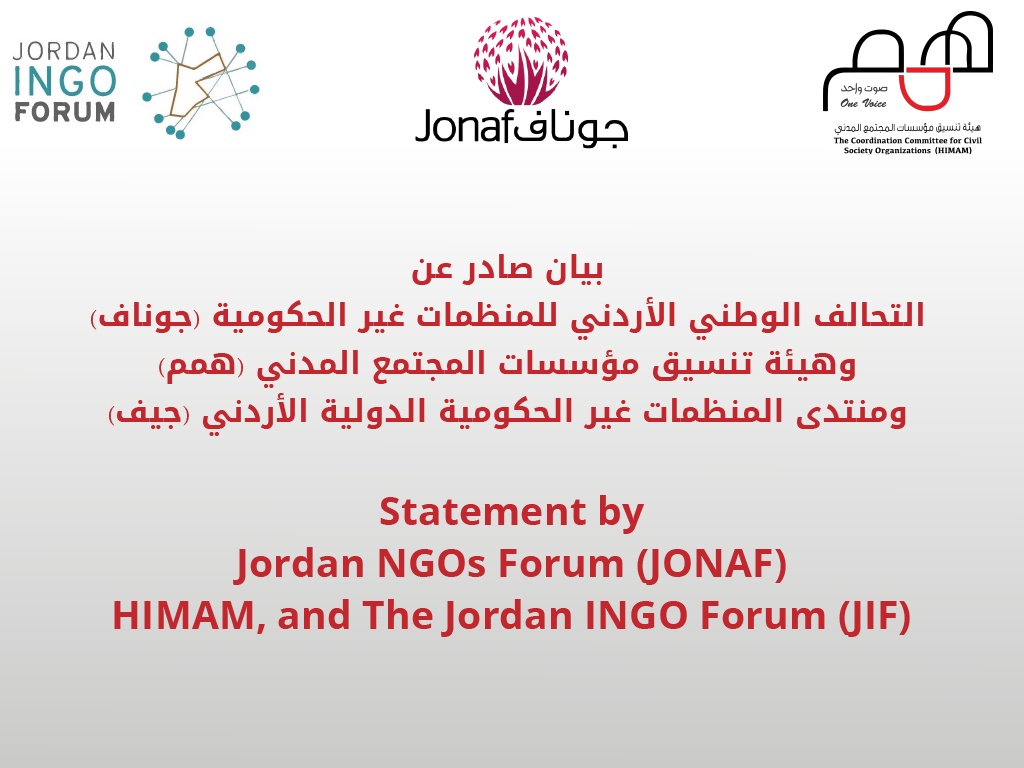Our three coalitions, consisting of national and international non-governmental organizations, strive to improve cooperation among government, civil society organizations (CSOs), and international non-governmental organizations (INGOs). Comprising over 200 leading and active NGOs working in Jordan, they play a role in the humanitarian and development sectors in the country, implementing programs aimed at addressing vulnerabilities and at achieving sustainable development goals that align with government policies and priorities, complementing the government efforts in this endeavor.
Global trends and conflicts increased the strain on Jordan’s economy, so there is now more important than ever to ensure strong collaboration, efficient implementation, and partnerships to ensure rapid response to urgent humanitarian needs, as well as long-term development goals. As NGOs, we are committed to working in partnership with the government of Jordan to achieve our shared goals. We are guided by modernization and response plans and act in line with international human rights and humanitarian principles. As such, NGOs greatly contribute to Jordan’s efforts in the humanitarian, social, economic, and governance fields. Our organizations work to fulfill the government’s goals in areas of public service, and provide needed help and added support to the government’s undertakings.
Despite efforts to prioritize and set policies by the Jordan Response Plan and the Modernization Reform Agenda, projects funded by international donors and implemented by CSOs and INGOs in Jordan are still subject to scrutiny and changes that can hinder implementation and conflict with national strategy. This poses challenges and obstacles. There is a focus on approval, rather than cooperation, in the mechanisms currently in place in Jordan.
The Information System for Jordan Response Platform for the Syria Crisis -JORISS system, used to handle projects under the Jordan Response Plan for Syrian refugees and affected host communities, has limitations in its online process. The duration for approval of implementation takes an average of four months, and not all mandatory reports are available to all the necessary ministries, leading to additional reporting requirements for NGOs. Additionally, for development and humanitarian projects outside of the Jordan Response Plan, there are various project approval mechanisms in place through MoPIC, MoSD, and other relevant ministries. This leads to a lack of coordination as various bodies prioritize different issues, causing a discrepancy with national strategies. The MOPIC should take a more proactive role in communicating the priorities set by the government. In addition, all Jordanian partners must also comply with the Foreign Funding Mechanism approval process.
Poor communication between the government and NGOs often causes confusion about each party’s goals, roles, and responsibilities, leading to mistrust and a lack of oversight. The committees responsible for making decisions in these response processes could benefit from clear frameworks and established terms of reference that facilitate smoother communication and help share information about the projects under review. This could help prevent misunderstandings, increase trust among stakeholders, and promote more effective collaboration and coordination, resulting in greater efficiency and wise utilization of resources.
His Majesty King Abdullah II has repeatedly expressed support for civil society. As the government of Jordan reviews and considers changes to the project approval processes and systems, we urge the government to ensure that any new system embodies His Majesty’s February 2022 call at the global summit on the disabled to “enhance cooperation between states, international organizations, civil society, and other stakeholders to increase inclusive development”.
Considering the changing reality and challenges faced, the important role of NGOs, as endorsed by His Majesty, the government, and international donors, it is imperative to draw on the experience of the past decade. We invite the government of Jordan to have an open dialogue around the design and reform of approval mechanisms and to consider the following recommendations presented on behalf of over 200 civil society organizations that we collectively represent:
1. Enhance coordination with donors to ensure speedy approval of projects clearly identified/aligned with bilateral or other agreements reached by the government and donors. This would enhance the rate of approval and overall efficiency of the system put in place.
2. Enhance transparency by publicly sharing information about all projects needing approvals and the status of the projects, and commit to clear timeframes for approval of projects to ensure that they are implemented within intended timeframes and that assistance to beneficiaries and the overall benefit and impact of projects is not compromised by excessive delays that could result in rushed implementation.
3. Empower an entity to evaluate projects and grant approvals, and that ensures coordination and collaboration with line ministries. By not conditioning approvals on cumbersome coordination preapprovals, the new mechanism would ensure speedy implementation of projects and prevent excessive delays, as well as the additional burden and pressure on line ministries to approve. It is important to recognize ongoing coordination and communication between NGOs and the government of Jordan / line ministries during the course of implementation of projects as a substitute for pre-approval delays.
The protracted nature of the Syrian crisis, the global recession, and emerging conflicts in the broader region require stronger synergy, efficiency, and overall cooperation between donors, the government of Jordan, and NGOs, to ensure an efficient and timely response, as well as investments to support Jordan’s generous hosting of refugees as well as further Jordan’s public, economic, and political modernization plans. Together, we can maximize the impact and benefit of the limited resources available to Jordan. We look forward to continuing to strengthen our cooperation and partnerships based on genuine trust and transparency. We are extending a genuine hand to the government in cooperation and urge it to remove unnecessary and cumbersome red tape. We genuinely hope that our message will get a response from Jordanian decision-makers.


